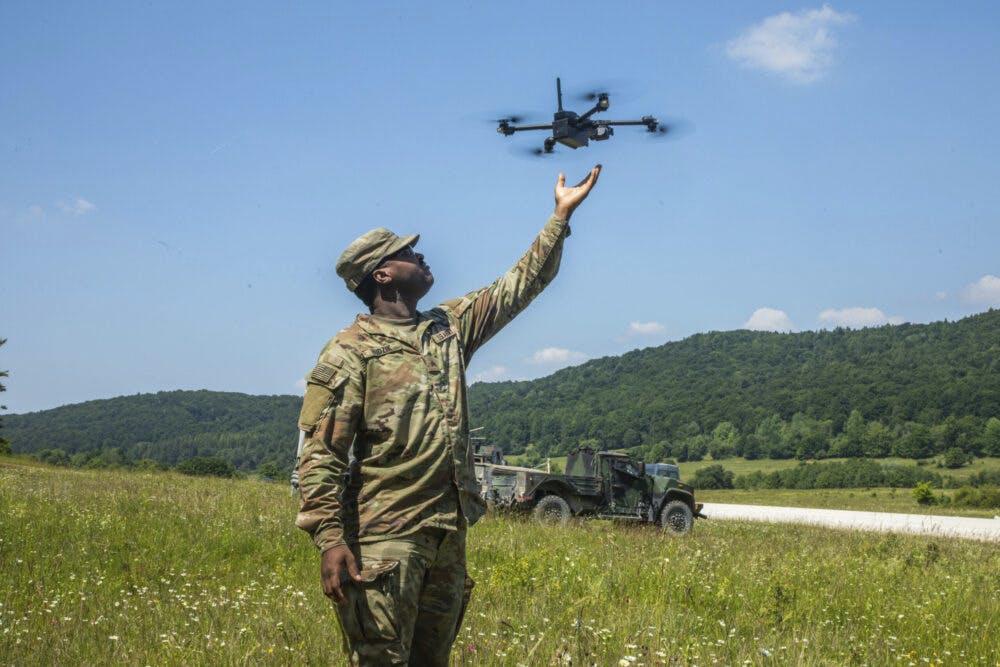Defense Leads Prioritize Data Governance Over Emerging Tech
Officials said they are tackling data challenges and measuring data success to prepare for modernized technology.

The Defense Department is targeting data literacy, governance, operationalization and secure sharing to enhance decision-making and efficiency, military leaders said Tuesday at AWS re:Invent in Las Vegas, Nevada.
Army Operationalizes Data
Army CIO Leonel Garciga said the service is focused on operationalizing existing data then integrating it across different functional areas while developing a data-literate workforce and data governance strategy.
“We definitely don’t have a technology problem. We have more technology than we know what to do with,” said Garciga. “What we really have right now is the hard work. That’s where we’re spending so much time [is] good governance on data. That’s really driving this idea of building the right requirement to solve the right problem.”
The Army is shifting its mindset with the concept of “echelonment of data,” distinguishing between enterprise data, to deliver the right information at the right time to make the right decisions.
Navy Measures Tech Success by Impact
Department of the Navy (DON) Acting CTO Justin Fanelli emphasized that how DON measures and communicates improvements made by technical investments, especially to non-technical stakeholders, will determine future success.
“Where we show that data [in the right place at the right time] has provided us more operational resilience or more adaptability … that’s where we need your help, [so] that you can say we’re not 10% better — that’s industrial grade improvement — we are 200% better. We are 700% better. Data is allowing us to do that,” Fanelli said.
Fanelli also stressed the need for data governance and streamlining at the speed of relevance, as well as the willingness to collaborate across service branches to leverage each other’s work faster.
“We’re going to be interdependent. We have to,” Fanelli said.
DLA Eyes APIs to Share Data
Defense Logistics Agency CIO Adarryl Roberts emphasized data’s potential to impact deterrence.
“We’re really looking at data as strategic asset because we don’t want to go to conflict. How do we use that make it more operational … to be a stronger deterrent in this world? We focus on data literacy.”
Roberts said creating an “API library” is part of DLA’s new mission to improve standards and data sharing, coupled with internal and external collaboration.
Roberts highlighted the importance of data sharing between DLA and industry to improve decision-making, emphasizing the need for the department’s new Cybersecurity Maturity Model Certification (CMMC) program.
“It’s a necessary evil. That’s our zero-trust model for our commercial partners,” Roberts said. “Data is vital for us to ensure our warfighters have everything they need before they even come in.”
Air Force Pushes for Infrastructure Design Patterns
Michael Medgyessy, CIO and CDO of the Air Force Intelligence Community, discussed how he is measuring success in data practices.
“It’s not really about the [data] volume. It’s about how many people care that you have it? Is it usable, and how in demand is that? … Am I making it an accessible format that’s secure but able to be used when needed, where needed? Then the technology solutions and the mindsets shift, so that the motivations of the various programs that have this data are now being rewarded by measuring how much to sharing it,” Medgyessy explained.
Medgyessy emphasized the importance of identifying infrastructure design patterns that allow the Air Force to move faster, rather than building custom solutions.
He pointed out that air-gapped classified networks do not offer the same capabilities as commercial networks and that infrastructure standards are crucial for success, saying, “a shared responsibility model has to be embraced.”
This is a carousel with manually rotating slides. Use Next and Previous buttons to navigate or jump to a slide with the slide dots
-

Navy Memo Maps Tech Priorities for the Future Fight
Acting CTO’s memo outlines critical investment areas, from AI and quantum to cyber and space, as part of an accelerated modernization push.
5m read -

DOD Can No Longer Assume Superiority in Digital Warfare, Officials Warn
The DOD must make concerted efforts to address cyber vulnerabilities to maintain the tactical edge, military leaders said at HammerCon 2025.
4m read -

Marine Corps Operation StormBreaker Slashes Software Delivery Timelines by 17x
New program aims to deliver critical digital capabilities to warfighters at the "speed of relevance" by overhauling traditional processes.
4m read -

DHA CDAO Spearheads Master Data Catalog to Boost Transparency
Jesus Caban plans to boost DHA's data maturity through a new master data catalog, governance frameworks and inventory of tech tools.
5m read -

Trump Orders Spark Government-Wide Acquisition Overhaul
As Trump pushes for a faster, simpler procurement system, agencies are leveraging AI and adapting strategies to meet new requirements.
5m read -

IRS Makes Direct File Code Public as Lawmakers Debate Program’s Fate
The agency sees the Direct File source code as beneficial to government digital services despite what happens with it in proposed budgets.
5m read -

A Look at Federal Zero Trust Transformation
Recent developments from CISA and DOD show how government is advancing zero trust quickly.
20m read -

Army Combines Commands to Propel Innovation Under New Transformation Plan
Lt. Gen. Miles Brown outlines a new transformation strategy after the AFC–TRADOC merger to integrate new technologies within 18 months.
4m read -

AI Enables Coast Guard’s Workforce to Transform Operations
The Coast Guard’s Deputy CIO Brian Campo delves into the ways AI is pushing the service to rethink its core services, workforce and operations.
14m watch -

New Army Acquisition Plan Cites Autonomy, Predictive Analytics
Officials outline how the Army Transformation Initiative signals a broader shift toward efficiency with tech and acquisition reform.
4m read -

DOE National Labs Launch New AI Tools for Operational Efficiency
The Energy Department's National Laboratories are using AI to increase operational efficiency and drive research efforts forward.
3m read -

AI Revolutionizes Defense Decision-Making
AI enhances access to vital information for defense leaders, empowering faster, more informed decision-making on and off the battlefield.
29m watch
















